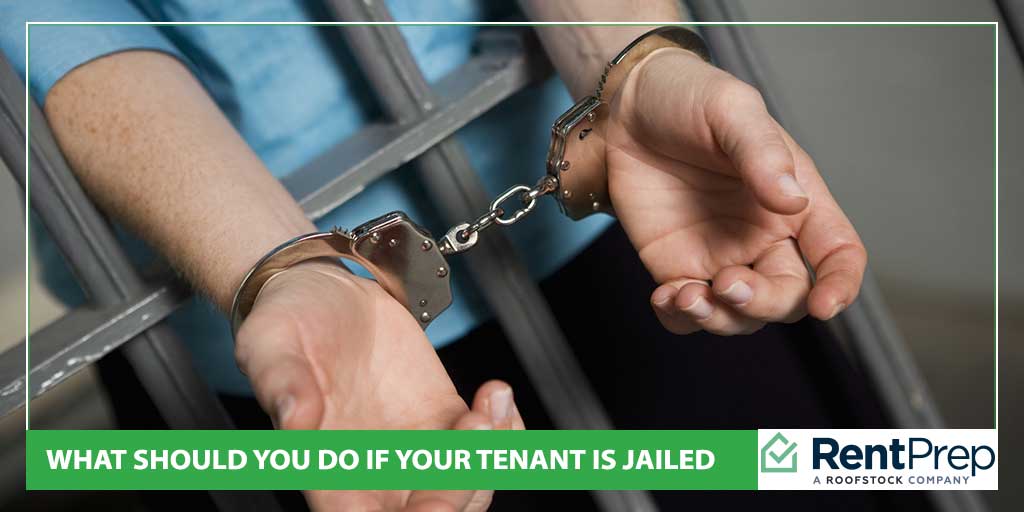
Millions of people spend some amount of time in jail each year, and it can be hard to imagine that that time might have an effect on your business. If, however, one of those people is your tenant, you might end up needing to figure out how to handle resulting issues at your property.
Do you know what you should do if your tenant is jailed while renting from you?
Many landlords assume that they can move straight to eviction, but that is not true. Even if a tenant is serving some time in jail, this will not automatically result in their eviction. In fact, evicting them or taking the wrong steps when a tenant is jailed could get you in trouble instead!
Learn how to go about evicting a jailed tenant and when that is allowed today, as well as some other important tips on how to proceed when a tenant is jailed.
A Table Of Contents For Evicting Jailed Tenants
- Step 1: Find Out If The Tenant Is In Jail
- Step 2: Get In Contact With The Tenant
- Step 3: Evict Non-Paying Tenants
- Additional Notes & Tips
Step 1: Find Out If The Tenant Is In Jail

Before you do anything else, you need to confirm whether or not the tenant is in jail. There have been cases where landlords did not know that a tenant in jail, and they assumed that the property was simply abandoned.
It’s important that you find out for sure if the tenant is in jail or not. Sometimes, a tenant or one of their contacts will let you know this information directly. If you haven’t heard anything for certain, however, it may be time to call their work and emergency contacts.
When making these types of calls, be sure that you do not specifically ask if the tenant is incarcerated or not. Instead, say that you need to get into contact with the tenant. After talking to these contacts, you should be able to find a way to communicate with your tenant.
Step 2: Get In Contact With The Tenant
Once you’re sure that the tenant is in jail, it might be time to go pay them a visit, especially if they have missed a rental payment.
At this point, you can offer the tenant a few different ideas for how to proceed together.
Option 1: Keep Renting
Depending on how long the tenant will be in jail, they may want to continue renting the property, and that’s totally okay! The rental lease that exists between you and your tenant is still valid even though the tenant is in jail.
Remind them that payments must still be made on time, and ask if there is any way that you can help to additionally secure the property in the meantime.
This tenant, despite their incarceration, can still be a good tenant. Work out the details with them, and let them know that your expectations for the rent and property condition will not change.
Secondary Renters
If there is another adult on the lease, the burden of rent will now fall completely to them. If the incarcerated tenant has a significant other that is not on the lease, they may be interested in taking over payments and management of the property while the other is incarcerated.
If this happens, make sure that you have the incarcerated tenant and your new tenant both sign updated lease agreements that make this clear. Both parties need to be in-the-know about this change, and you need to be able to hold the new tenant liable in the same way you did the original tenant.
Option 2: Vacated Unit
In many states, it is possible to have an incarcerated tenant sign off on a document which states that they have vacated the property. If they vacate the property, the lease can end early, and their property can be handled as well.
To do this, you’ll need to come to an agreement with the tenant about how the cleaning out of the property will be handled, and then draft up an official document that explains what will be done. Then, a notary public should work to make this document official.
If you prefer to have the incarcerated tenant vacate the property while they serve jail time, you can offer them some incentives to make this option more appealing. Specifically, these are some things that you might want to offer the tenant:
- Waive any overdue back rent
- Offer to store the tenant’s property until they are out
- Offer to set up what their family or friends need to be able to move their belongings out
Step 3: Evict Non-Paying Tenants

In some cases, it will not be possible to work out a deal with the tenant, and they will stop paying rent. If they will not agree to sign documents saying that they vacated the property and are not paying rent, it is time to evict them.
As mentioned above, the lease agreement that your tenant and you signed is still valid even after they are incarcerated. This means that once they stop paying, you are able to serve them an eviction notice for non-payment of rent.
You’ll want to follow the standard steps for eviction in your state, citing non-payment of rent as the primary reason for the eviction:
- Send a notice of eviction for non-payment of rent
- Wait the appropriate amount of time (depends on the state)
- File for eviction with the local courthouse
- Attend the hearing, if necessary
- Complete the eviction
The eviction process may take a little bit longer than usual because there are additional hoops that the legal system must move through when working with an incarcerated tenant. You are still permitted to file for eviction, but it may take the judge and appropriate organizations more time to ensure that the tenant is not required to receive any extra time or protections.
Additional Notes & Tips
In some states, it is also more appropriate to evict a tenant for abandonment rather than non-payment of rent, as the condition of them being incarcerated makes it impossible to pay rent. Check your local laws or courthouse to be sure of how you should file.
Additionally, remember that you need to follow all the legal steps in your state to deal with their abandoned property. You cannot simply throw it all away, as this is illegal in most states. Instead, you’ll need to contact their emergency contacts and be sure that there is an opportunity for their belongings to be claimed.
Finally, consider adding a clause to your lease that allows for the termination of the contract should a tenant be convicted of a felony. Tenants can go to jail for non-felony charges, but felonies are more serious and can be addressed as such in a rental lease.
Protect Your Property
Regardless of how you feel about your tenant’s incarceration, it is important to make sure that your property is protected. What should you do if your tenant is jailed while renting from you? Move to find out if anyone will be paying rent, have them agree to vacate the property, or move towards eviction.
Evicting jailed tenants is never fun, but it is, unfortunately, something that you may need to do in your time as a landlord. As long as you go about it in an organized fashion, it should not be impossible to do.

